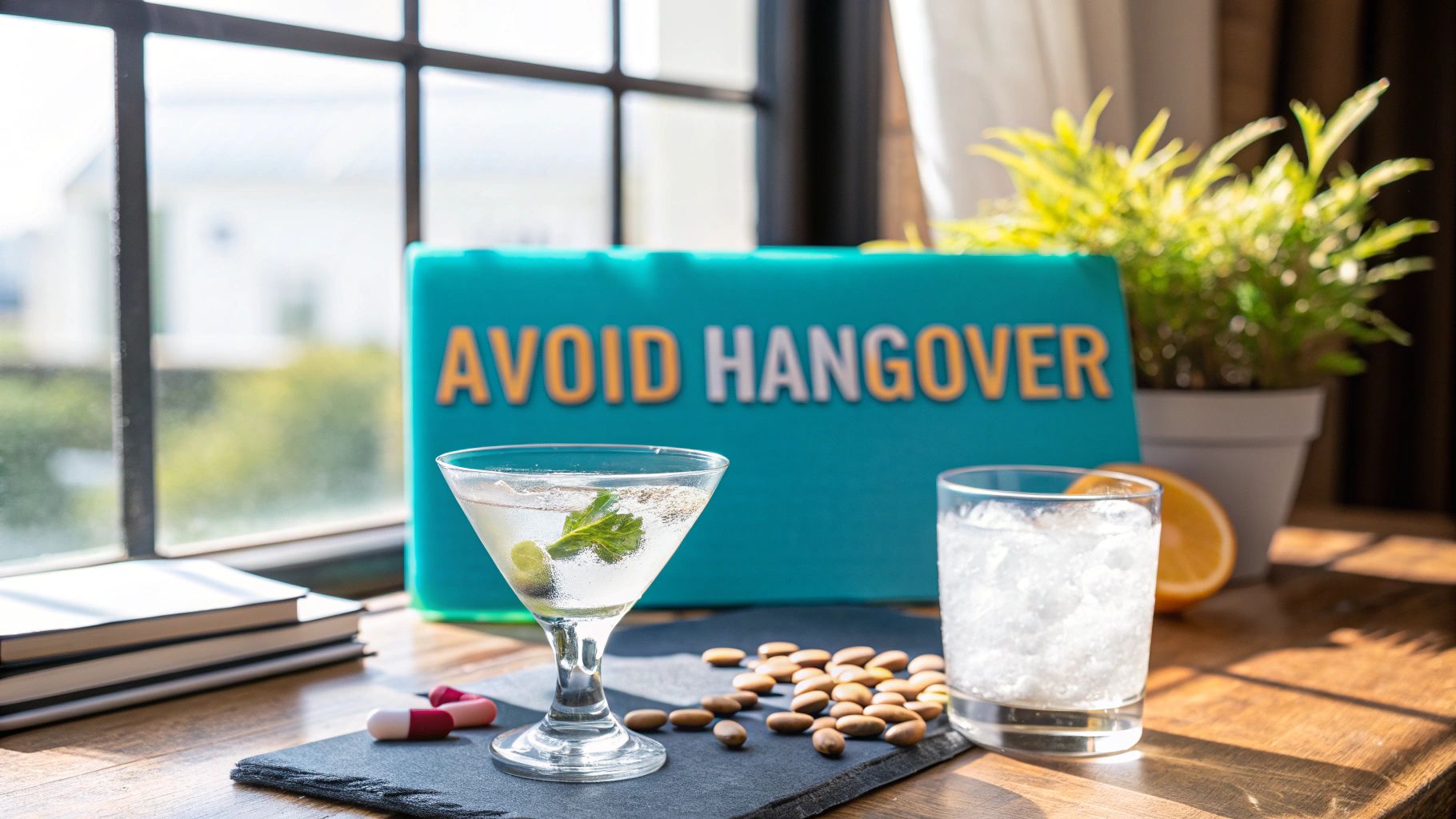

· By Annemarie
8 Expert Tips to Avoid Hangover & Feel Better Fast
Everyone enjoys a celebratory drink, but the dreaded next-day hangover can turn a great night into a day of regret. Characterized by headaches, nausea, and fatigue, a hangover is the body's complex reaction to alcohol, involving dehydration, an inflammatory response, and sleep disruption. The good news? You can proactively manage these effects and wake up feeling refreshed.
This guide moves beyond folklore and dives into scientifically-backed, actionable strategies you can implement before, during, and after your social event. We’ll provide a comprehensive plan to help you avoid hangover symptoms entirely, ensuring you can enjoy life's celebrations without sacrificing your well-being the next day. You will learn how to make smarter choices about what you drink, when you eat, and how strategic supplementation can make all the difference.
From nutritional timing to smart hydration and pacing yourself correctly, this listicle breaks down eight powerful methods for a better morning after. Get ready to transform your approach to social drinking with practical tips that allow you to participate in the fun and still feel productive and clear-headed. It's time to enjoy your night out and your morning after with confidence.
1. Stay Hydrated Before, During, and After Drinking
Hydration is arguably the most fundamental and effective strategy to avoid hangover symptoms. Alcohol is a diuretic, which means it increases urine production. This process dehydrates your body, leading to the classic hangover culprits: headache, fatigue, and dry mouth. Alcohol also inhibits the release of vasopressin, a key antidiuretic hormone (ADH) that helps your body retain water. Without it, your kidneys send water directly to your bladder instead of reabsorbing it into the body.
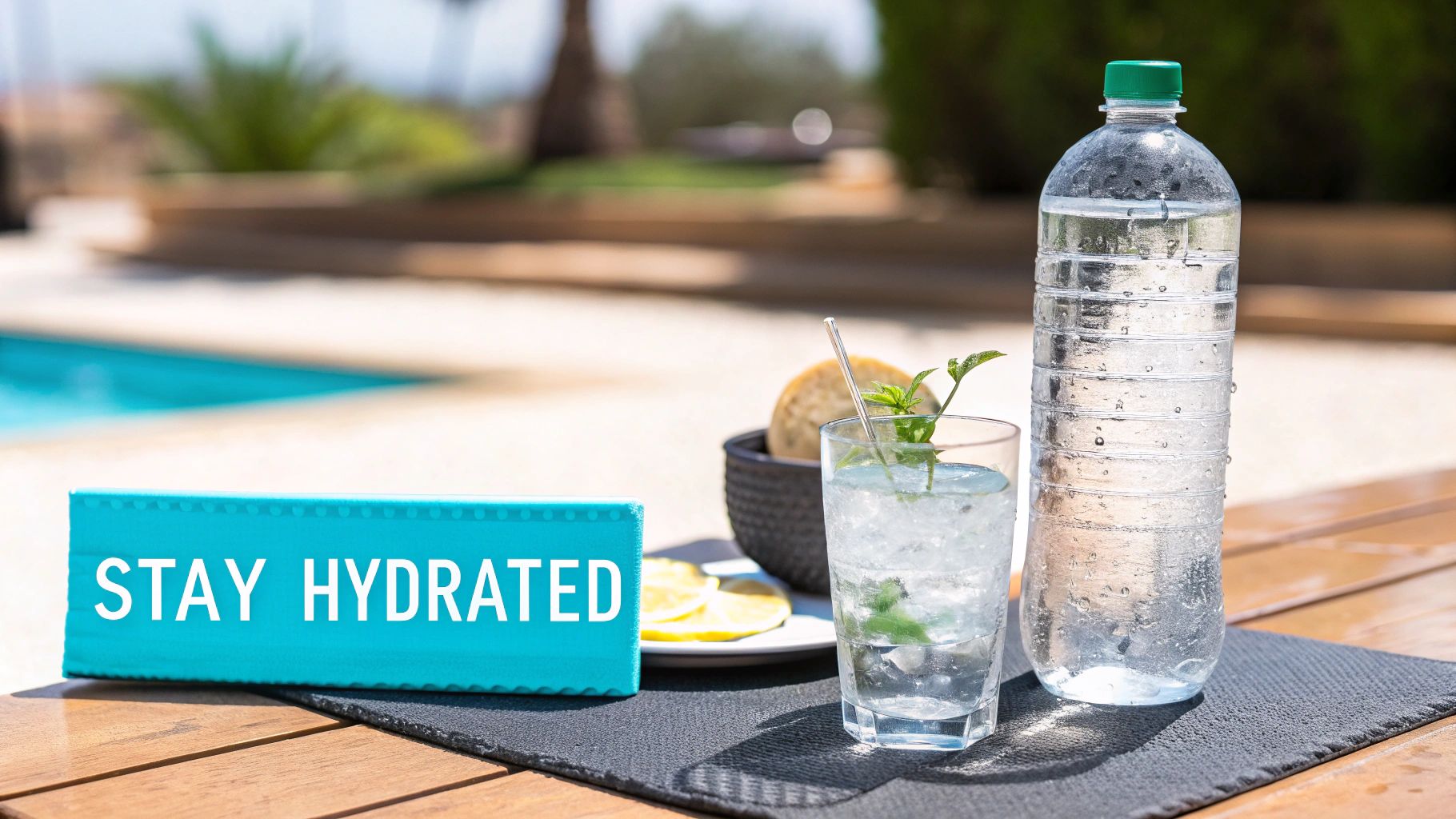
Why Hydration Works
By consciously maintaining your fluid levels, you counteract alcohol's dehydrating effects. This proactive approach ensures your organs and brain have the water they need to function properly, significantly reducing the severity of your post-drinking malaise. Proper hydration helps your body flush out alcohol's toxic byproducts more efficiently, aiding your liver and kidneys in the detoxification process.
How to Implement a Hydration Strategy
A successful hydration plan starts long before your first drink and continues after your last. This three-phase approach ensures you are prepared, maintained, and recovered.
Actionable Tips:
- Pre-Hydrate: Drink 16-20 ounces of water a few hours before you start drinking. This creates a hydration buffer.
- Follow the 1:1 Rule: For every alcoholic beverage you consume, drink a full glass of water. This simple habit is the most effective way to stay hydrated throughout the night.
- Enhance with Electrolytes: Dehydration isn't just about water loss; it's also about electrolyte loss. Add an electrolyte powder or tablet to your water before bed and upon waking to replenish essential minerals like sodium, potassium, and magnesium.
- Post-Drinking Rehydration: Keep a large water bottle by your bed. Taking a few sips if you wake up during the night and drinking the rest in the morning helps kickstart your recovery.
2. Eat Before and While Drinking
Drinking on an empty stomach is a surefire way to accelerate alcohol's effects and intensify the next day's hangover. Consuming a substantial meal before and snacking during your drinking session is a critical strategy to avoid hangover symptoms. Food in your stomach, especially meals rich in fats, proteins, and complex carbohydrates, slows the absorption of alcohol from your small intestine into your bloodstream. This prevents a rapid spike in your blood alcohol concentration (BAC), giving your liver a fighting chance to metabolize the alcohol at a more manageable pace.
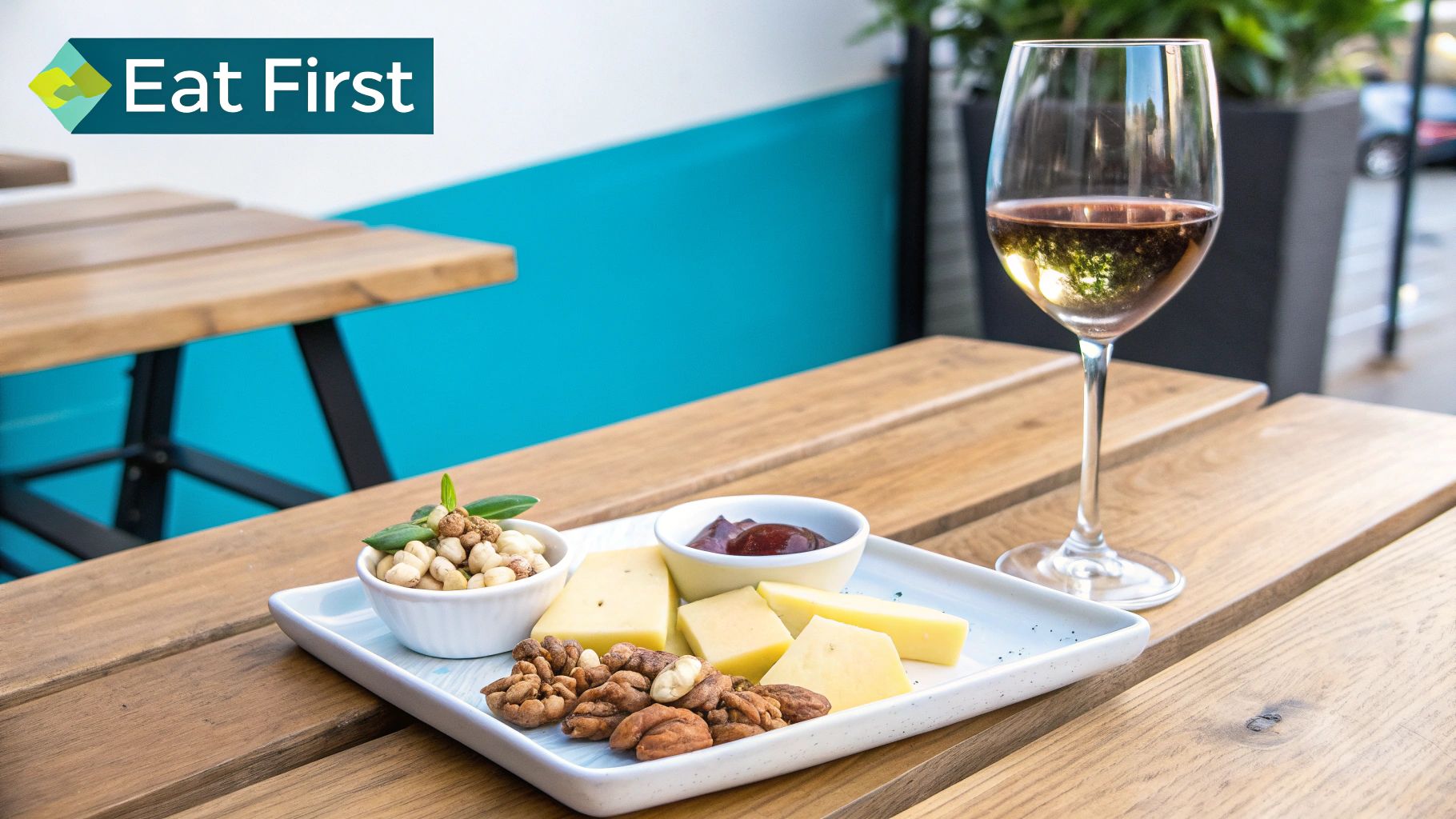
Why Eating Works
By slowing down alcohol absorption, you are effectively reducing the peak BAC your body experiences. This lessens the immediate intoxicating effects and, more importantly, reduces the toxic burden on your system. A slower, more gradual processing of alcohol means less acetaldehyde buildup, a primary toxin responsible for many hangover feelings. This approach also helps maintain stable blood sugar levels, which can plummet when drinking, leading to fatigue and weakness.
How to Implement a Pre-Drinking Meal Strategy
A successful eating strategy isn't just about grabbing a last-minute slice of pizza; it involves planning a balanced meal beforehand and having smart snacks on hand. This ensures your body is primed to handle alcohol more efficiently.
Actionable Tips:
- Plan Your Pre-Game Meal: About 1-2 hours before you start drinking, eat a balanced meal. Focus on healthy fats (avocado, olive oil), lean proteins (chicken, fish), and complex carbs (sweet potatoes, brown rice) to provide sustained energy and slow absorption.
- Snack Strategically: Don't stop eating once you start drinking. Opt for snacks like nuts, cheese, or olives. Many sports bars offer food specials for a reason; take advantage of them to keep something in your stomach.
- Focus on Nutrient-Rich Foods: Choose foods high in B vitamins and zinc, as alcohol can deplete these crucial nutrients. Foods like red meat, whole grains, and legumes are excellent choices.
- Never Drink on Empty: The most crucial rule is to never drink on a completely empty stomach. Even a small, protein-rich snack is vastly better than nothing and can significantly impact how you feel the next day.
3. Choose Quality Alcoholic Beverages and Avoid Congeners
Not all drinks are created equal when it comes to the aftermath, and being selective is a powerful way to avoid hangover misery. The key culprits are congeners, chemical byproducts of fermentation and aging that give many spirits and wines their distinct flavors and aromas. These compounds, including methanol, acetone, and tannins, are essentially toxins that your body must process, significantly intensifying hangover symptoms like headaches and nausea.
Why Choosing Quality Works
Selecting beverages low in congeners reduces the toxic load on your liver. While your body still has to metabolize ethanol, it isn't fighting a two-front war against other impurities. Generally, clearer spirits like premium vodka and gin have far fewer congeners than darker options like brandy, whiskey, and red wine. Higher-quality beverages also undergo more meticulous distillation and filtration processes, which are specifically designed to remove these unwanted compounds, resulting in a cleaner drink and a less painful morning.
The bar chart below clearly illustrates the significant difference in congener levels across common alcoholic drinks.
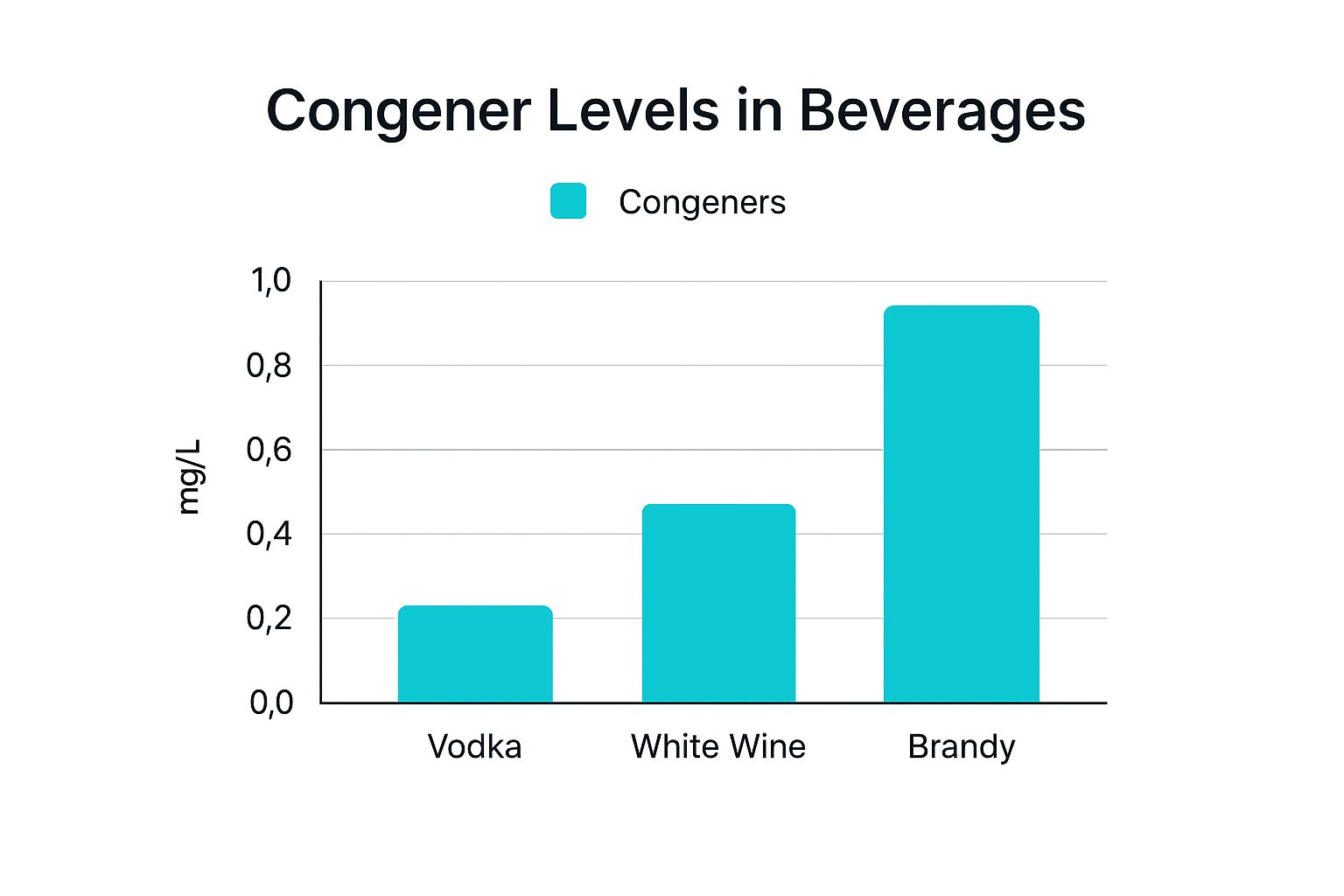
As the data shows, switching from a high-congener drink like brandy to a low-congener one like vodka can drastically reduce your intake of these hangover-inducing compounds.
How to Implement a Low-Congener Strategy
Making smarter choices at the bar or liquor store is a straightforward yet highly effective tactic. Focus on purity and simplicity over complex, dark, or artificially flavored options.
Actionable Tips:
- Opt for Clear Spirits: Make vodka, gin, or high-end white rum your go-to choices. These typically have the lowest congener content.
- Be Wary of Dark Liquors: Whiskey, brandy, dark rum, and tequila are high in congeners. If you choose to drink them, opt for premium, well-distilled brands.
- Choose White Wine Over Red: White wine generally contains fewer congeners than red wine. For an even cleaner option, look for organic wines with minimal sulfite additives.
- Read the Label: Avoid spirits and liqueurs with added sugars, artificial flavors, or coloring. The fewer ingredients, the better. A tequila made from 100% agave is a much better choice than a "mixto" tequila with added sugars. If you'd like to dive deeper, you can learn more about what causes hangovers on enjoyupside.com.
4. Take Vitamin B Complex and Electrolyte Supplements
Alcohol consumption significantly depletes your body's stores of essential nutrients. Specifically, it uses up B vitamins for its metabolism and causes you to flush out vital electrolytes through increased urination. This depletion is a major contributor to hangover symptoms like fatigue, brain fog, and muscle aches. To avoid hangover effects linked to nutrient loss, supplementing with a vitamin B complex and electrolytes is a scientifically-backed strategy.
This approach was popularized by functional medicine practitioners and specialized clinics like Dr. Jason Burke's "Hangover Heaven," which uses IV drips rich in these nutrients. The concept is simple: by replacing what alcohol takes away, you support your body's natural recovery processes, from energy production to nervous system function.
Why Supplementation Works
B vitamins, particularly B1, B6, and B12, are coenzymes essential for breaking down alcohol and its toxic byproduct, acetaldehyde. Replenishing them helps your body metabolize alcohol more efficiently. Electrolytes like potassium, sodium, and magnesium are critical for nerve signaling, muscle function, and maintaining proper fluid balance. Restoring them counteracts dehydration's cellular impact and reduces symptoms like headaches and weakness.
How to Implement a Supplementation Strategy
Strategic timing is key to making this method effective. You want to arm your body with these nutrients before drinking and replenish them afterward to support recovery.
Actionable Tips:
- Prep with B Vitamins: Take a high-quality B-complex supplement two to three hours before you start drinking. This ensures your metabolic pathways are primed and ready to process alcohol.
- Replenish Electrolytes Mid-Session: Instead of just water, alternate alcoholic drinks with water enhanced with an electrolyte powder. This helps maintain mineral balance throughout the night. For a more comprehensive look at supplementation, you can explore the best supplements for hangover prevention on enjoyupside.com.
- Take Magnesium for Sleep: Consuming a magnesium supplement before bed can help counteract alcohol's disruptive effect on sleep. It promotes muscle relaxation and can lead to a more restorative night's rest.
- Focus on Bioavailability: Choose supplements that are easily absorbed by the body. Look for terms like "chelated" for minerals or "methylated" for B vitamins, which indicate higher bioavailability and effectiveness.
5. Pace Your Drinking and Set Limits
One of the most effective ways to avoid hangover symptoms is by controlling the speed and volume of your alcohol consumption. Your liver processes alcohol at a relatively fixed rate, metabolizing roughly one standard drink per hour. When you drink faster than this, alcohol accumulates in your bloodstream, raising your blood alcohol concentration (BAC) and putting significant stress on your body, which directly contributes to a more severe hangover.
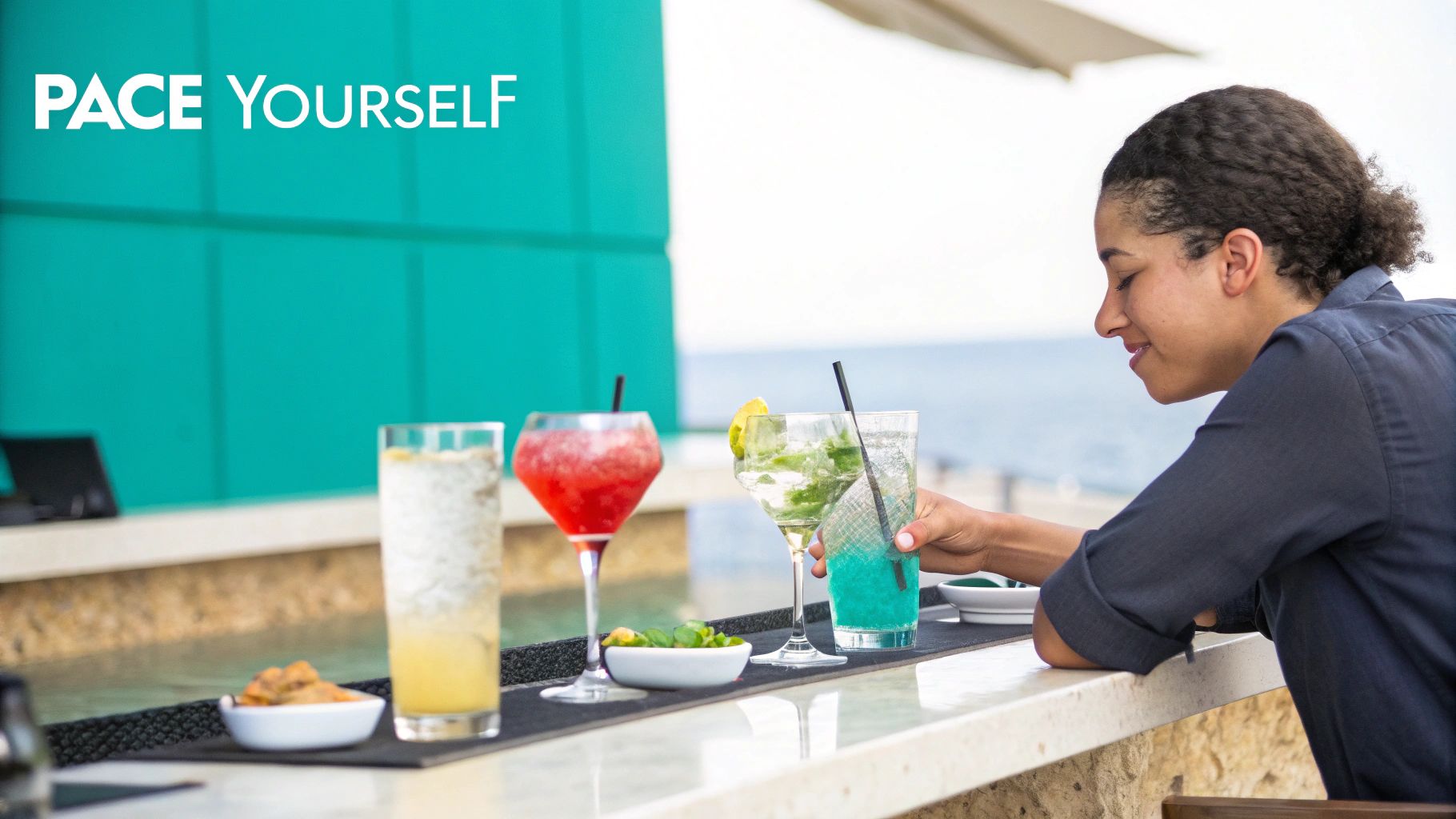
Why Pacing Works
By consciously pacing your intake, you allow your body's natural detoxification processes to keep up. This prevents your system from becoming overwhelmed with alcohol and its toxic byproduct, acetaldehyde. Setting clear limits before you even start drinking provides a crucial mental guardrail, helping you make responsible choices throughout the event and significantly reducing the likelihood of overconsumption and the dreaded next-day consequences. This strategy is promoted by public health campaigns and responsible hospitality initiatives for its proven effectiveness.
How to Implement a Pacing Strategy
A successful pacing plan involves mindfulness and a bit of pre-planning. Deciding on your limit and your method for tracking drinks beforehand removes the guesswork and makes it easier to stick to your goals, even in a highly social setting.
Actionable Tips:
- Set a Hard Limit: Before your first drink, decide on a specific number of drinks you will have for the entire evening and commit to it.
- Track Your Intake: Use a smartphone app like 'DrinkCoach' or simply make a note for each drink you have. This visual reminder is a powerful tool for moderation.
- Space Your Drinks: Actively wait at least one hour between each alcoholic beverage. Use this time to drink a full glass of water or a non-alcoholic alternative.
- Choose Lower ABV Options: Opt for beer, light ciders, or wine spritzers instead of high-proof spirits or complex cocktails to slow alcohol absorption. For more tips, you can learn more about how to pace yourself while drinking on enjoyupside.com.
6. Get Adequate Sleep
While many focus on what to consume, the role of restorative sleep in how you avoid hangover symptoms is often underestimated. Alcohol severely disrupts your natural sleep architecture. Although it may initially make you feel drowsy, it suppresses REM sleep, the most mentally restorative stage, and leads to more frequent awakenings later in the night. This disruption is a direct cause of the fatigue, irritability, and poor concentration characteristic of a bad hangover.
Why Sleep Works
Prioritizing a full night's rest gives your body the uninterrupted time it needs to perform critical repair and detoxification processes. While you sleep, your brain clears out toxins, your liver works to metabolize alcohol, and your body focuses on cellular repair. Sacrificing sleep after drinking is like asking your body to run a marathon and then clean the entire stadium without a break; it simply amplifies the negative effects. As sleep researchers like Dr. Matthew Walker have emphasized, quality sleep is non-negotiable for cognitive function and physical recovery.
How to Implement a Sleep Strategy
A smart sleep strategy involves planning ahead and creating an optimal environment for rest, both before and after a night out. This ensures that the sleep you do get is as high-quality as possible, maximizing your body's natural recovery abilities.
Actionable Tips:
- Create a "Landing Strip": Stop drinking alcohol at least 3-4 hours before your planned bedtime. This gives your body time to begin metabolizing the alcohol, reducing its disruptive impact on your sleep cycles.
- Aim for 7-9 Hours: Plan your night to allow for a full 7 to 9 hours of sleep. If you have an early morning, consider ending your night out sooner to protect your recovery time.
- Optimize Your Sleep Environment: Keep your bedroom as cool, dark, and quiet as possible. Blackout curtains, a white noise machine, or an eye mask can significantly improve sleep quality by minimizing disruptions.
- Avoid Late-Night Stimulants: Steer clear of caffeine found in coffee, some sodas, or late-night espresso martinis. Caffeine can linger in your system for hours and will further sabotage your sleep quality.
7. Consider Natural Hangover Remedies and Supplements
Beyond foundational strategies like hydration, certain natural remedies and supplements offer a targeted approach to avoid hangover symptoms. These compounds, often rooted in traditional medicine, have gained scientific interest for their ability to support the body's natural detoxification and recovery processes. Ingredients like milk thistle, ginger, and Korean pear extract work by protecting the liver, settling the stomach, and aiding alcohol metabolism.
Why Natural Supplements Work
Natural remedies can provide specific support where your body needs it most after drinking. For example, milk thistle contains silymarin, an antioxidant compound that helps protect liver cells from alcohol-induced damage. Meanwhile, gingerols in ginger are known to combat nausea, a common hangover complaint. Others, like Korean pear extract, have been shown to increase the activity of enzymes that break down alcohol, helping to clear it from your system faster.
How to Implement a Supplement Strategy
Incorporating natural remedies requires planning and choosing high-quality products. Unlike drinking water, timing is often crucial for these supplements to be effective, as many need to be taken before you even start drinking.
Actionable Tips:
- Protect Your Liver: Take a high-quality milk thistle supplement containing at least 80% silymarin a few hours before you plan to drink. This gives the active compounds time to start working.
- Prevent Nausea: If you are prone to an upset stomach, drink ginger tea before you go out or take a ginger capsule. You can also have some on hand for the next morning.
- Metabolize Faster: Studies on Korean (or Asian) pear juice suggest drinking about 8 ounces before alcohol consumption can reduce overall hangover severity by up to 20% by speeding up alcohol metabolism.
- Do Your Research: The supplement market is vast. Look for products from reputable brands like Flyby or Cheers that use third-party testing to verify the purity and potency of their ingredients.
8. Avoid Mixing Different Types of Alcohol
The old saying "beer before liquor, never been sicker" holds more than just anecdotal wisdom; it's a simplified guide to a key strategy to avoid hangover effects. Mixing various types of alcoholic beverages, such as beer, wine, and spirits, over a single evening can significantly worsen your hangover. This is due to a combination of factors, including consuming a wider range of congeners and making it harder to track your total alcohol intake.
Different drinks contain different types of congeners, the chemical byproducts of fermentation that give beverages their distinct flavors and aromas. By introducing a complex medley of these compounds from various sources, you place a greater burden on your liver to process them, which can intensify hangover symptoms like headaches and nausea.
Why Sticking to One Drink Works
Choosing one type of alcohol for the night simplifies the job for your body. Your system only has to process one profile of congeners, which can reduce the overall toxic load. Furthermore, sticking to one drink type, like beer or wine, makes it much easier to pace yourself and accurately gauge how much you have consumed, preventing you from accidentally overindulging. This method helps maintain a more predictable rate of alcohol absorption.
How to Implement a Single-Drink Strategy
Adopting this approach is about making a conscious decision before your first sip. It’s a simple yet highly effective way to manage your night and the morning after.
Actionable Tips:
- Choose Your Drink for the Night: Decide whether it will be a wine, beer, or a specific spirit-based cocktail night and stick with that choice exclusively.
- If You Must Switch, Go Up: If switching is unavoidable, try to move from a lower alcohol-by-volume (ABV) drink to a higher one (e.g., beer to a spirit). This may help moderate your overall consumption pace.
- Watch Your Mixers: Even when sticking to one spirit, be mindful of mixers. Sugary and carbonated mixers can speed up alcohol absorption and contribute to your hangover. Opt for simple mixers like club soda, water, or fresh juice.
- Practice at Themed Events: Beer festivals or wine tastings are perfect examples. These events are designed around enjoying variations of a single type of alcohol, reinforcing the principle of not mixing different categories.
8 Key Strategies to Avoid Hangovers Comparison
| Strategy | Implementation Complexity 🔄 | Resource Requirements ⚡ | Expected Outcomes 📊 | Ideal Use Cases 💡 | Key Advantages ⭐ |
|---|---|---|---|---|---|
| Stay Hydrated Before, During, and After Drinking | Low: Requires consistent water intake | Minimal: Water and optionally electrolyte supplements | Moderate reduction in dehydration-related symptoms | Social events, parties, anytime alcohol is consumed | Simple, cost-effective, supports overall health |
| Eat Before and While Drinking | Moderate: Planning meals/snacks | Moderate: Access to nutrient-rich foods | Significant reduction in peak intoxication and hangover | Meals paired with drinking, dinners, social drinking settings | Slows alcohol absorption, stabilizes blood sugar |
| Choose Quality Alcoholic Beverages and Avoid Congeners | Moderate: Selecting specific alcohol types | High: Premium/low-congener beverages may cost more | Noticeable reduction in hangover severity | Alcohol selection for sensitive individuals or special events | Reduces toxic byproduct intake, better taste |
| Take Vitamin B Complex and Electrolyte Supplements | Low-Moderate: Supplement regimen | Low: Over-the-counter supplements | Supports nutrient replenishment, reduces deficiency symptoms | Routine supplementation before/after drinking | Scientifically supported, easy to incorporate |
| Pace Your Drinking and Set Limits | High: Requires discipline and self-control | Minimal: No extra resources required | Most effective at preventing severe hangovers | High-risk drinking occasions, parties requiring moderation | Prevents rapid intoxication, saves money |
| Get Adequate Sleep | Moderate: Lifestyle adjustment | None: Focus on sleep environment optimization | Improves recovery, reduces fatigue and cognitive impact | Post-drinking recovery, health-focused individuals | Natural, enhances overall recovery |
| Consider Natural Hangover Remedies and Supplements | Moderate: Finding and using specific remedies | Low to Moderate: Purchase of herbal/natural supplements | Variable symptom relief | Complementary approach to hangover prevention | Natural, multiple mechanisms, minimal side effects |
| Avoid Mixing Different Types of Alcohol | Low: Simple behavioral guideline | None: No additional resources needed | Moderate decrease in hangover severity | Social drinking with diverse beverage options | Easier monitoring, predictable intoxication |
Cheers to Smarter Celebrations
Navigating the world of social drinking doesn't have to be a gamble between a great night out and a miserable morning after. The power to avoid hangover symptoms lies not in a single magic bullet but in a strategic, multi-faceted approach. By now, you've seen that the path to a brighter next day is paved with conscious choices made before, during, and after you raise a glass. It’s about transforming your habits from reactive damage control to proactive, intelligent self-care.
We've explored eight powerful pillars for smarter celebrations. From the foundational importance of hydration and nourishment to the nuanced strategies of choosing low-congener drinks and pacing your intake, each tip is a tool in your arsenal. You now understand that a well-timed meal isn't just about lining your stomach; it’s about slowing alcohol absorption and providing your body with the fuel it needs for the demanding task of metabolization.
The Proactive Mindset: Your Best Defense
The most significant shift you can make is moving from a passive participant to an active architect of your social experiences. This means planning ahead isn't an afterthought; it's part of the ritual.
- Before You Go: Think like an athlete preparing for an event. Hydrate throughout the day, eat a balanced meal rich in proteins and healthy fats, and take your supplements like B vitamins to fortify your system.
- During the Event: Be mindful and present. Alternate each alcoholic drink with a full glass of water. Set a clear limit for yourself and stick to it. Choose your beverages wisely, steering clear of sugary mixers and congener-heavy options.
- After the Night Ends: Your work isn't done. A final glass of water, perhaps with an electrolyte packet, and prioritizing a full night of quality sleep are non-negotiable steps to support your body's recovery process.
Key Takeaway: The ultimate strategy to avoid a hangover is a holistic one. It combines hydration, nutrition, moderation, and targeted supplementation into a seamless routine that supports your body at every stage.
Embracing these practices empowers you to enjoy the connection and joy of social gatherings without sacrificing your productivity, health, or happiness the following day. It’s about respecting your body’s limits and giving it the support it needs to process alcohol efficiently. A hangover is not an inevitable consequence of a good time; it's a sign that your body was pushed beyond its capacity without the necessary resources. By implementing these strategies, you can rewrite that narrative, ensuring that your memories of a great night aren't clouded by a morning of regret. Make this informed, proactive approach your new standard for celebration.
Ready to add a powerful, convenient tool to your smarter drinking toolkit? Upside Hangover Sticks are designed with key ingredients like Dihydromyricetin (DHM), B vitamins, and electrolytes to support your body's natural recovery process. Make them a part of your routine and discover how easy it is to wake up feeling your best. Visit the Upside Hangover Sticks website to elevate your next celebration.
